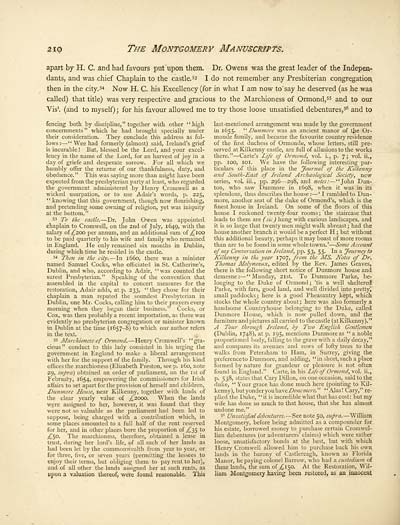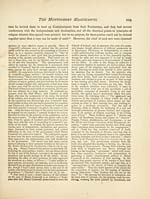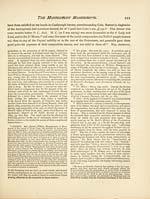Montgomery manuscripts
(224) Page 210
Download files
Complete book:
Individual page:
Thumbnail gallery: Grid view | List view

210
The Montgomery Manuscripts.
apart by H. C. and had favours put upon them. Dr. Owens was the great leader of the Indepen-
dants, and was chief Chaplain to the castle.^ I do not remember any Presbiterian congregation,
then in the city. 54 Now H. C. his Excellency (for in what I am now to' say he deserved (as he was
called) that title) was very respective and gracious to the Marchioness of Ormond, 55 and to our
Vis 1 , (and to myself); for his favour allowed me to try those loose unsatisfied debentures, 56 and to
fencing both by discipline," together with other "high
concernments" which he had brought specially under
their consideration. They conclude this address as fol-
lows: — " Wee had formerly (almost) said, Ireland's grief
is incurable ! But, blessed be the Lord, and your excel-
lency in the name of the Lord, for an harvest of joy in a
day of griefe and desperate sorrow. For all which we
humbly offer the returne of our thankfulness, duty, and
obedience." This was saying more than might have been
expected from the presbyterian party at least, who regarded
the government administered by Henry Cromwell as a
wicked usurpation, or to use Adair's words, p. 225,
' ' knowing that this government, though now flourishing,
and pretending some owning of religion, yet was iniquity
at the bottom."
53 To the castle. — Dr. John Owen was appointed
chaplain to Cromwell, on the 2nd of July, 1649, with the
salary of £200 per annum, and an additional sum of £100
to be paid quarterly to his wife and family who remained
in England. He only remained six months in Dublin,
during which time he resided in the castle.
54 Then in the city. — In 1660, there was a minister
named Samuel Cocks, who officiated in St. Catherine's,
Dublin, and who, according to Adair, "was counted the
surest Presbyterian." Speaking of the convention that
assembled in the capital to concert measures for the
restoration, Adair adds, at p. 233, "they chose for their
chaplain a man reputed the soundest Presbyterian in
Dublin, one Mr. Cocks, calling him to their prayers every
morning when they began their business." Cocks, or
Cox, was then probably a recent importation, as there was
evidently no presbyterian congregation or minister known
in Dublin at the time (1657-S) to which our author refers
in the text.
55 Marchioness of Ormond. — Henry Cromwell's "gra-
cious" conduct to this lady consisted in his urging the
government in England to make a liberal arrangement
with her for the support of the family. Through his kind
offices the marchioness (Elizabeth Preston, see p. 160, note
29, supra) obtained an order of parliament, on the 1st of
February, 1654, empowering the commissioners for Irish
affairs to set apart for the provision of herself and children,
Dunmore House, near Kilkenny, together with lands of
the clear yearly value of ^2000. When the lands
were assigned to her, however, it was found that they
were not so valuable as the parliament had been led to
suppose, being charged with a contribution which, in
some places amounted to a full half of the rent reserved
for her, and in other places bore the proportion of ^35 to
£$0. The marchioness, therefore, obtained a lease in
trust, during her lord's life, of all such of her lands as
had been let by the commonwealth from year to year, or
for three, five, or seven years (permitting the lessees to
enjoy their terms, but obliging them to pay rent to her),
and of all other the lands assigned her at such rents, as
upon a valuation thereof, were found reasonable. This
last-mentioned arrangement was made by the government
in 1655. " Dunmore was an ancient manor of tjie Or-
monde family, and became the favourite country residence
of the first duchess of Ormonde, whose letters, still pre-
served at Kilkenny castle, are full of allusions to the works
there." — Carte's Life oj Ormond, vol. i., p. J; vol. ii.,
pp. 100, 101. We have the following interesting par-
ticulars of this place in the yournal oj the Kilkenny
and South-East of Ireland Archaeological Society, new
series, vol. iii., pp. 296 — 29S, and notes: — "John Dun-
ton, who saw Dunmore in 1698, when it was in its
splendour, thus describes the house : — ' I rambled to Dun-
more, another seat of the duke of Ormond's, which is the
finest house in Ireland. On some of the floors of this
house I reckoned twenty-four rooms ; 'the staircase that
leads to them are (sic) hung with curious landscapes, and
it is so large that twenty men might walk abreast ; had the
house another branch it would be a perfect H ; but without
this additional beauty, perhaps it may boast of more rooms
than are to be found in some whole towns. ' — Some Account
of my Conversation in Ireland, pp. 53, 55. In a fourneyto
Kilkenny in the year 1707, from the MS. Notes of Dr.
Thomas Molyneaux, edited by the Rev. James Graves,
there is the following short notice of Dunmore house and
demesne: — " Munday, 21st. To Dunmore Parke, be-
longing to the Duke of Ormond ; 'tis a well sheltered
Parke, with furs, good land, and well divided into prettyj
small paddocks ; here is a good Pheasantry kept, which
stocks the whole country about ; here was also formerly a
handsome Countryhouse belonging to the Duke, called
Dunmore House, which is now pulled down, and the
furniture and pictures all carried to thecastle (at Kilkenny). "
A Tour through Ireland, by Two English Gentlemen
(Dublin, 1748), at p. 195, mentions Dunmore as "a noble
proportioned body, falling to the grave with a daily decay,"
and compares its avenues and rows of lofty trees to the
walks from Petersham to Ham, in Surrey, giving the
preference to Dunmore, and adding, "in short, such a place
formed by nature for grandeur or pleasure is not often
found in England." Carte, in his Life of Ormond, vol. ii. ,
p. 538, states that Cary Dillon, on one occasion, said to the
duke, "Your grace has done much here (pointing to Kil-
kenny), but yonder you have Z><W£V««'.?." "Alas! Cary," re-
plied the Duke, " it is incredible what that has cost : but my
wife has done so much to that house, that she has almost
undone me."
5 6 Unsatisfied debentures. — See note 50, supra. — William
Montgomery, before being admitted as a compounder for
his estate, borrowed money to purchase certain Cromwel-
lian debentures (or adventurers' claims) which were rather
loose, unsatisfactory bonds at the best, but with which
Henry Cromwell allowed him to purchase back his own
lands in the barony of Castlereagh, known as Florida
Manor, he paying colonel Barrow, who had a custodium of
these lands, the sum of .£150. At the Restoration, Wil-
liam Montgomery having been restored, as an innocent
The Montgomery Manuscripts.
apart by H. C. and had favours put upon them. Dr. Owens was the great leader of the Indepen-
dants, and was chief Chaplain to the castle.^ I do not remember any Presbiterian congregation,
then in the city. 54 Now H. C. his Excellency (for in what I am now to' say he deserved (as he was
called) that title) was very respective and gracious to the Marchioness of Ormond, 55 and to our
Vis 1 , (and to myself); for his favour allowed me to try those loose unsatisfied debentures, 56 and to
fencing both by discipline," together with other "high
concernments" which he had brought specially under
their consideration. They conclude this address as fol-
lows: — " Wee had formerly (almost) said, Ireland's grief
is incurable ! But, blessed be the Lord, and your excel-
lency in the name of the Lord, for an harvest of joy in a
day of griefe and desperate sorrow. For all which we
humbly offer the returne of our thankfulness, duty, and
obedience." This was saying more than might have been
expected from the presbyterian party at least, who regarded
the government administered by Henry Cromwell as a
wicked usurpation, or to use Adair's words, p. 225,
' ' knowing that this government, though now flourishing,
and pretending some owning of religion, yet was iniquity
at the bottom."
53 To the castle. — Dr. John Owen was appointed
chaplain to Cromwell, on the 2nd of July, 1649, with the
salary of £200 per annum, and an additional sum of £100
to be paid quarterly to his wife and family who remained
in England. He only remained six months in Dublin,
during which time he resided in the castle.
54 Then in the city. — In 1660, there was a minister
named Samuel Cocks, who officiated in St. Catherine's,
Dublin, and who, according to Adair, "was counted the
surest Presbyterian." Speaking of the convention that
assembled in the capital to concert measures for the
restoration, Adair adds, at p. 233, "they chose for their
chaplain a man reputed the soundest Presbyterian in
Dublin, one Mr. Cocks, calling him to their prayers every
morning when they began their business." Cocks, or
Cox, was then probably a recent importation, as there was
evidently no presbyterian congregation or minister known
in Dublin at the time (1657-S) to which our author refers
in the text.
55 Marchioness of Ormond. — Henry Cromwell's "gra-
cious" conduct to this lady consisted in his urging the
government in England to make a liberal arrangement
with her for the support of the family. Through his kind
offices the marchioness (Elizabeth Preston, see p. 160, note
29, supra) obtained an order of parliament, on the 1st of
February, 1654, empowering the commissioners for Irish
affairs to set apart for the provision of herself and children,
Dunmore House, near Kilkenny, together with lands of
the clear yearly value of ^2000. When the lands
were assigned to her, however, it was found that they
were not so valuable as the parliament had been led to
suppose, being charged with a contribution which, in
some places amounted to a full half of the rent reserved
for her, and in other places bore the proportion of ^35 to
£$0. The marchioness, therefore, obtained a lease in
trust, during her lord's life, of all such of her lands as
had been let by the commonwealth from year to year, or
for three, five, or seven years (permitting the lessees to
enjoy their terms, but obliging them to pay rent to her),
and of all other the lands assigned her at such rents, as
upon a valuation thereof, were found reasonable. This
last-mentioned arrangement was made by the government
in 1655. " Dunmore was an ancient manor of tjie Or-
monde family, and became the favourite country residence
of the first duchess of Ormonde, whose letters, still pre-
served at Kilkenny castle, are full of allusions to the works
there." — Carte's Life oj Ormond, vol. i., p. J; vol. ii.,
pp. 100, 101. We have the following interesting par-
ticulars of this place in the yournal oj the Kilkenny
and South-East of Ireland Archaeological Society, new
series, vol. iii., pp. 296 — 29S, and notes: — "John Dun-
ton, who saw Dunmore in 1698, when it was in its
splendour, thus describes the house : — ' I rambled to Dun-
more, another seat of the duke of Ormond's, which is the
finest house in Ireland. On some of the floors of this
house I reckoned twenty-four rooms ; 'the staircase that
leads to them are (sic) hung with curious landscapes, and
it is so large that twenty men might walk abreast ; had the
house another branch it would be a perfect H ; but without
this additional beauty, perhaps it may boast of more rooms
than are to be found in some whole towns. ' — Some Account
of my Conversation in Ireland, pp. 53, 55. In a fourneyto
Kilkenny in the year 1707, from the MS. Notes of Dr.
Thomas Molyneaux, edited by the Rev. James Graves,
there is the following short notice of Dunmore house and
demesne: — " Munday, 21st. To Dunmore Parke, be-
longing to the Duke of Ormond ; 'tis a well sheltered
Parke, with furs, good land, and well divided into prettyj
small paddocks ; here is a good Pheasantry kept, which
stocks the whole country about ; here was also formerly a
handsome Countryhouse belonging to the Duke, called
Dunmore House, which is now pulled down, and the
furniture and pictures all carried to thecastle (at Kilkenny). "
A Tour through Ireland, by Two English Gentlemen
(Dublin, 1748), at p. 195, mentions Dunmore as "a noble
proportioned body, falling to the grave with a daily decay,"
and compares its avenues and rows of lofty trees to the
walks from Petersham to Ham, in Surrey, giving the
preference to Dunmore, and adding, "in short, such a place
formed by nature for grandeur or pleasure is not often
found in England." Carte, in his Life of Ormond, vol. ii. ,
p. 538, states that Cary Dillon, on one occasion, said to the
duke, "Your grace has done much here (pointing to Kil-
kenny), but yonder you have Z><W£V««'.?." "Alas! Cary," re-
plied the Duke, " it is incredible what that has cost : but my
wife has done so much to that house, that she has almost
undone me."
5 6 Unsatisfied debentures. — See note 50, supra. — William
Montgomery, before being admitted as a compounder for
his estate, borrowed money to purchase certain Cromwel-
lian debentures (or adventurers' claims) which were rather
loose, unsatisfactory bonds at the best, but with which
Henry Cromwell allowed him to purchase back his own
lands in the barony of Castlereagh, known as Florida
Manor, he paying colonel Barrow, who had a custodium of
these lands, the sum of .£150. At the Restoration, Wil-
liam Montgomery having been restored, as an innocent
Set display mode to:
![]() Universal Viewer |
Universal Viewer | ![]() Mirador |
Large image | Transcription
Mirador |
Large image | Transcription
Images and transcriptions on this page, including medium image downloads, may be used under the Creative Commons Attribution 4.0 International Licence unless otherwise stated. ![]()
| Histories of Scottish families > Montgomery manuscripts > (224) Page 210 |
|---|
| Permanent URL | https://digital.nls.uk/95235615 |
|---|
| Description | A selection of almost 400 printed items relating to the history of Scottish families, mostly dating from the 19th and early 20th centuries. Includes memoirs, genealogies and clan histories, with a few produced by emigrant families. The earliest family history goes back to AD 916. |
|---|

